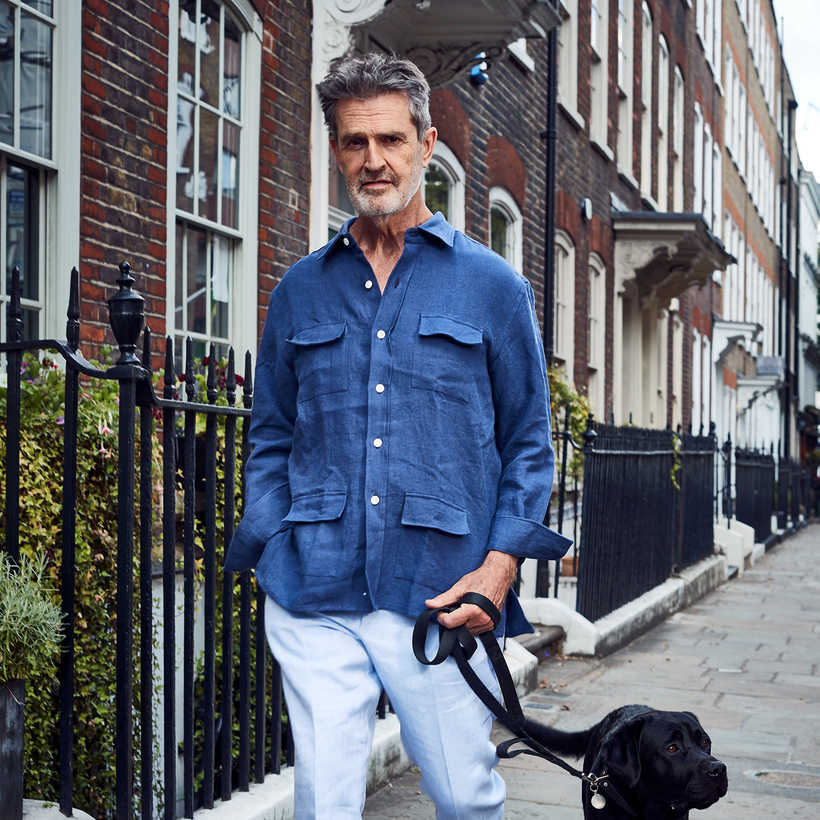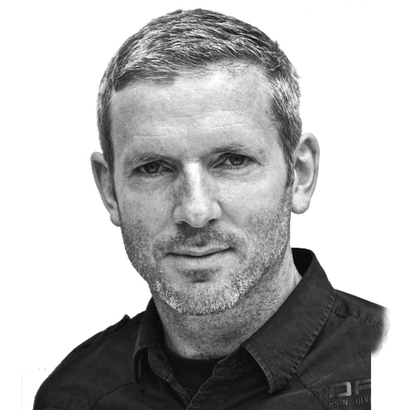On a sleepy Thursday morning in the quiet corner of a Bloomsbury café, Rupert Everett announces that he’s feeling breathless. Not literally breathless, but metaphorically so. The 64-year-old actor, writer and showbiz stalwart is about to begin a new theatrical project, John Mortimer’s acclaimed autobiographical play A Voyage Round My Father, and has reached that point in rehearsals where “I really don’t know what I’m doing”.
He is emotionally and psychologically breathless. Which is curious. Because moments later Everett is actually breathless and briefly white as a sheet. He’s midway through a rant on the misery of modern London life (“I think Sadiq Khan is a moron”) when he suddenly asks: “Is it getting dark in here or is it just me?” It is, alas, just him, so he shouts out, panic stricken, in the direction of the bar, “Did someone put the lights down in here or am I having a brain hemorrhage?”

An awkward few seconds pass during which I wonder if this is how it’s going to end. This is our sixth encounter over the past 13 years, and each time previously the star of Dance with a Stranger, My Best Friend’s Wedding and The Happy Prince has delighted in speculating about his ultimate exit: collapsing dramatically in a theater dressing room; being consumed from the inside by a monstrous ailment; death by firing squad.
Today, thankfully, death by interview is not on the menu and after a few sips of water Everett is back in full flow, robust as ever, pulverizing Khan for his 20-miles-per-hour traffic zones and pillorying clueless pedestrians for being smartphone zombies. He will later say, tellingly, “I come from the survivor generation rather than the victim generation.”
In person, despite the momentary meltdown, Everett is more easygoing than ever. His sixties suit him, and he sits rakishly before a table of coffee and toast with shirt unbuttoned and floppy hair fully gray, proudly noting that the incessant primping of the past — dye jobs, facial blood injections, Botox and hyperbaric oxygen treatments — are gone forever.
“I come from the survivor generation rather than the victim generation.”
“I’ve stopped all that and it’s an enormous relief,” he says. “I don’t really care anymore, and I don’t ever look in the mirror.” In fact, he adds, he doesn’t even work out anymore and his only exercise is walking the four-year-old Labrador, Pluto, that he shares with his long-term Brazilian partner, Henrique (the pair — Henrique and Pluto — are also in the café when I arrive, but soon leave for Everett’s nearby flat).
Other things that have gone by the wayside? The gossipy yet lacerating put-downs, honed over three irrepressible memoirs and a thousand media appearances. Madonna was likened to an “old whiny barmaid”, Julia Roberts “smelt vaguely of sweat”, Piers Morgan was “hung like a budgie”, Michael Jackson “looked like a character from Shrek” and Caitlyn Jenner was not a woman, but “a cross-dressing man”. And today? “I can’t anymore,” he says, groaning. “It’s just too exhausting. And too terrifying. You have to be incredibly careful now. I find even doing an interview quite scary. There are so many people who are ready to jump on things. And nobody can digest anything in a humorous way anymore.”

The instinct, though, is still there. When discussing the stellar career progress of Kenneth Branagh, who began his professional life opposite Everett in a West End production of Another Country in 1981, he launches into a disquisition on the perilous nature of fame that ends with: “Whoever makes it work has a genius of some sort. And Kenneth has made it work.” There’s a tiny beat, then he adds the fabulously catty flourish: “With no lips.”
Two days later when the Russell Brand story breaks, I text him for his thoughts, since they starred together in St Trinian’s. He replies that he will talk about anything but that. He lets a few seconds pass and, in classic gag mode, sends a follow-on text (referring to the brief dalliance between Brand and the Labour Party) that reads: “Ed Miliband must be feeling a bit of a twat.”

The closest he comes today to even borderline controversy is some reflex fury surrounding the new Leonard Bernstein biopic, Maestro. He’s been following the media coverage from the Venice Film Festival and is appalled that the film has been accused of “gay-face” (unlike Bernstein, the lead actor, Bradley Cooper, is not gay) and “Jew-Face” (unlike Bernstein, Cooper is not Jewish). “Oh it’s rubbish! Rubbish!” he howls. “All of it! ‘You have to be one thing to play that thing!’ You have to be Jewish to play Jewish? Gay to play gay? Are gays really that different from straights? Maybe on the surface, but really it’s ridiculous.”
The majority of his ire, however, is reserved for his own perceived failures. He says he learned the “mechanics of fame” too late. So while his Eighties peers, including Branagh, Colin Firth (or “Frothy”) and Daniel Day-Lewis (or “Deeney Night Debenhams — it’s what I always hope he calls himself when staying in hotels”), were carefully courting the industry gatekeepers, Everett was “lashing out in all the wrong directions”.

Of course now it’s different, he says, and he finds being an older person in show business “very comforting”. He discusses the “loveliness” of doing A Voyage Round My Father with familiar faces, such as the director Richard Eyre and his co-star Julian Wadham, who was a friend at Ampleforth, the Catholic independent school. He was drawn to the play by the complex nature of his character, the father, based on Mortimer’s own father Clifford, a blind legal ace. “I have an eye condition myself too,” he adds, casually. “Glaucoma. It’s not a bad one, but it makes you realize the miracle of sight.”
He says that his genius “modus operandi” for this stage in his career is greedily to gobble up all available senior roles by playing older than he actually is. “Because I’ve still got my marbles, so I can play 80-year-olds and remember my lines.” As evidence, he points to his recent scene-stealing appearance as an ancient theatrical agent opposite Gemma Arterton in the series Funny Woman and his role as a wizened stroke victim in the Harry Styles drama My Policeman.

He also, last year, played the Duke of Wellington in Ridley Scott’s forthcoming film Napoleon, although he was afflicted with Covid just before shooting started. “I had to play my scene from my bed,” he says. “It was set during the Treaty of Vienna. It was a huge scene, and obviously I couldn’t come in because I had Covid, so they let me do my lines from bed, via computer. Then later they filmed me in character, in Malta.”
He’s got another book coming too, and delivered the manuscript this week. “It’s a book of all the pitches I’ve done for movies that have never got picked up.” Plus, most importantly, there’s his next directorial project, following his acclaimed Oscar Wilde drama The Happy Prince. This one, called Lost and Found in Paris, is based on his reckless years in the French capital in the 1970s, and the cast includes Kristin Scott Thomas, John Malkovich and Frothy (naturally). There’s just one problem. No one wants to pay the almost $10 million budget. “Unfortunately, The Happy Prince didn’t perform at the box office and that’s a big problem,” he says. “The only thing that really counts is failure. Failure terrifies the business and it’s difficult to recover from.”
He learned the “mechanics of fame” too late.
This leads inevitably back to self-recrimination and his mishandling of his early career. “Compared to Kenneth Branagh? What a mess,” he begins. “I had a lot of individuality and raw something, but I never learned how to focus and, looking back, for me, everything was just about sex. Everything. And it felt for a while like liberty, to f*** everyone. But once you’d f***ed everyone, or even in the process of f***ing everyone, you realized that it then became a prison. It was an appetite that wasn’t fulfillable other than just whacking up the numbers.”

I want to ask about sex and his childhood, as a therapist might say. He cuts me short and says he’s never been to therapy, saying, “The idea of discovering yourself through therapy is bogus.” Nonetheless, he has spoken before about the “emotional cauterization” of his childhood. The son of the no-nonsense Major Anthony Everett, he was dropped off by his beloved mother at Farleigh boarding school in Hampshire, aged seven, suitcase in hand, traumatized. I wonder, and have wondered five times previously, if this primal ache is connected to the subsequent acting out? To the eventual London exodus aged 16, the wanton private life and “brief amateur career in the ranks of the oldest profession” (male prostitution), then drama school and an eventual early film career during which he was, by his own admission, a monstrous diva and “a bit of a c***” who was focused only on sex?
“No,” he says firmly. “It was the hormones, married to a need to become something. I don’t think it was to do with not having love as a child. It was partly just wanting to assert what you think is your star quality. And for me what was interesting about sex was, as soon as I felt myself unattractive I felt the sex was unattractive. So, in the end, it was just about me.”
The movie highlights of classic-era Everett include Dance with a Stranger, The Madness of King George and one enormously charismatic role as George Downes in My Best Friend’s Wedding. He later said, with excessive modesty, that the role was “a foolproof piece of writing. No actor could fail.” These days, in between his slew of old person performances, he says that it’s all about getting Lost and Found in Paris made. “To me, that is the most important thing in my life right now,” he says. “Even though I realize that’s slightly a malfunction, to have it be the most important thing. But it is.”

He ends with random chat. On acting through “old marbleiszd skin”, the rise of political intolerance and trying desperately to ingratiate himself into Scott’s Gladiator sequel (“It didn’t work”). Then, of course, amid farewells and see-you-soons, there’s another closing quip about finally reaching the end of life. “The prospect of the actual thing finishing off, and of me dying?” he says. “I actually feel excited by that.”
Three days later, the Russell Brand story is getting bigger, not smaller. I text Everett one last time, just to make sure he has no thoughts to share. His reply? “There’s nothing more to say than has been said. Sorry to be a bore, but I’m against people piling in. It’s done. He’s down. Let’s all move on.”
A Voyage Round My Father is now on at the Theatre Royal Bath until October 7
Kevin Maher is the chief film critic for The Times of London and the author of two novels, The Fields and Last Night on Earth


